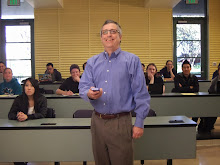For those of you that are regular visitors at ProfessorVC, I apologize for the long hiatus over the holidays and beyond. I know there are at least a few of you as I received several emails this week along the lines of "no new posts since November???"
Well, I'm back. Was amused to read about Right Side Capital this week. They have raised a fund to provide seed funding of $50-$250K to 100-200 start-ups. Rather than going through their networks or targeting specific sectors for deal flow, they are going to rely on an algorithm to select companies. The formula will be based on the founders' experience, schools they attended and other background information to gauge the likelihood of success. This certainly gives new meaning to "drive by investing" which became popular in the late 90's....
My first reaction is incredulity that limited partners would buy into this idea. Of course, when 10-year returns for the entire venture capital asset class is about to drop below zero, drastic measures may be in order. Seed stage investing is all about the team, so there may be something to this idea. For firms that don't have access to the most successful entrepreneurs, trying to predict an individual or individual teams success rate based on experience, personal attributes, intellect, etc. might very well be a good way to find some promising first time entrepreneurs. This is not far from the Y Combinator model, except they put a lot of time and energy into working with the entrepreneurs. With 2 or 4 new investments per week that Right Side is projecting, it will be challenging enough to remember the names of the entrepreneurs in their portfolio, let along help build companies.
This got me thinking about the debate over serial entrepreneurs and whether success breeds success or complacency. My colleague, Anu Basu, Director of the Silicon Valley Center for Entrepreneurship at San Jose State, recently completed a paper on this topic, "Does Experience Matter? A Comparison Between Novice and Serial Entrepreneurs" Her research shows that there is a positive correlation between prior founding experience and new venture performance due to stronger and more diverse social networks, access to capital, reliance on collaborators and other factors.
While this is not surprising, it would be interesting to look at returns provided to venture capital firms from novice and serial entrepreneurs. Serial entrepreneurs would be more likely to have larger personal investment in the company, have taken outside investment at higher valuations and possibly less open to taking big "bet the company" type risks.
Of course, given the state of venture returns, perhaps randomly picking from a stack of business plans would provide as good or better results than an entrepreneur selection algorithm or detailed due diligence. I recall that the WSJ used to run a contest in stock picking between investment analysts and selection by darts. The random selection fared quite well against the analysts and now the contest has shifted to readers vs. darts. The darts seem to be doing quite well over the past few years...
How the U.S. Became A Science Superpower
6 hours ago
